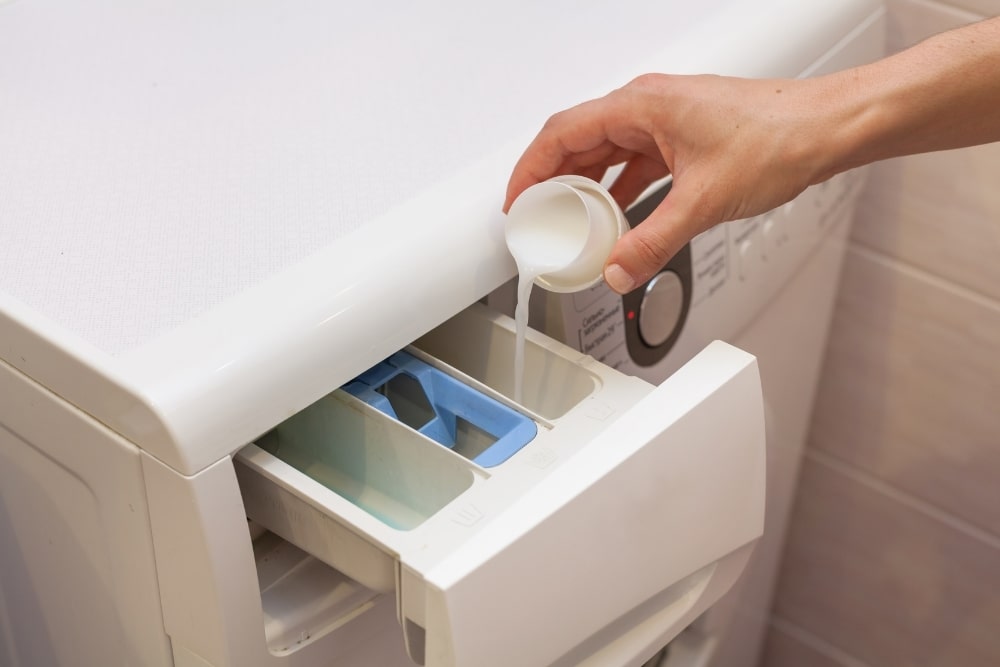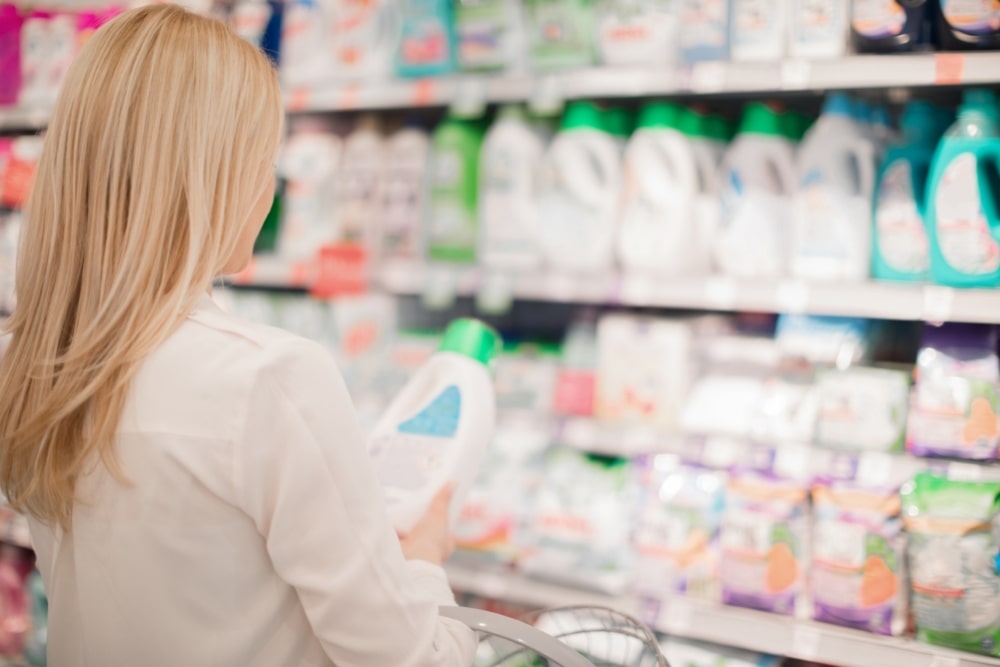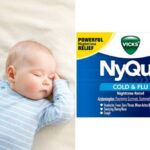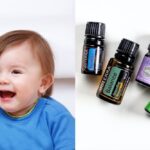It doesn’t take long to discover that having a baby means the laundry is never really caught up. Instead, there always seems to be another load in the basket. They seem to spit up on your favorite onesie over and over again.
After so many washes, clothing can feel a bit rougher than it did when it was new. It leaves most of us wondering whether you can use fabric softener on baby clothes.
According to most, you should avoid it if possible due to the dyes, chemicals, etc. that are in it.
Can I Use Fabric Softener On Baby Clothes?
Personally, I don’t think you should use fabric softener on baby clothes. Yes, there are a lot of fabric softeners on the market that are loaded with harmful chemicals and dyes.
That lasting smell on your baby’s onesie does come with a price tag, and I’m not just referring to the money that you spend on the fabric softener itself.
Some chemicals and dyes are harmful to your baby. They can make your baby more likely to develop an allergic reaction. Specific chemicals can also make your baby’s clothing less flame resistant.
Is It Safe To Use Fabric Softener On Baby Clothes?
Yes and no. I know that’s not the answer that you want to hear, but it’s not about using fabric softener or alternative methods to make your baby’s clothing softer. Instead, it’s about what type of fabric softener or method you are using.
There are fabric softeners on the market that are created with more natural ingredients, and others that are safer alternatives for your baby than leading brands, such as Tide.
It’s important to research products before using them on your baby or your baby’s things.
What About Fabric Softener Making Clothing Less Flame Resistant?
It’s true. There are chemicals that can wear away at the flame-resistant fabrics to make them less flame resistant. However, if your baby is in a fire, a flame-resistant sleeper is not going to save their life.
The smoke inhalation alone can be fatal, even if your little one is not near the flames. Don’t rely on things like this to actually benefit you as a parent. They give you peace of mind but do very little in an actual emergency situation.
View in gallery
Dangerous Ingredients In Fabric Softener
When you’re trying to decide on a fabric softener to use, it’s important to check the ingredient list. This doesn’t just apply to when you’re searching for a fabric softener for your baby, it applies with you’re picking products for the whole family.
There are quite a few dangerous ingredients lurking in everyday household products.
Benzyl Acetate
This ingredient has been linked to pancreatic cancer. That’s not something that you want up against your body, or your baby’s.
Ethanol
Ethanol has been linked to higher incidences of central nervous system disorders.
Benzyl Alcohol
Benzyl alcohol has been identified as an upper respiratory irritant. That means that it can cause things like a dry cough, etc. because it irritates the airways. This may be one of the culprits behind people stating that fabric softener causes asthma.
Glutaral
This ingredient may also be listed as Glutaraldehyde. It has been linked to asthma and can irritate the skin.
A baby has very sensitive skin. So, they are more likely to develop a rash and other symptoms if something used in the washing or drying process has ingredients that are known to cause adverse reactions.
Hexylene Glycol
It has been associated with irritating the skin, eyes, and upper respiratory system. If you find that you can’t use a particular fabric softener because of these symptoms, it could be due to this one ingredient.
Other Harmful Ingredients
Although the ingredients listed above are the most common toxic ingredients found in fabric softener, there could be others lurking on the ingredient list as well. Watch out for these ingredients:
- Chloroform
- Formaldehyde
- Linalool
- Limonene
- Camphor
- Alpha Terpineol
I’m sure that there are others as well, so please do not consider this the ultimate list of toxic ingredients found in fabric softeners. However, these are the most common ingredients that are linked to things like cancer, skin irritation, and respiratory distress.
What Kind Of Fabric Softener To Use On Baby Clothes
View in gallery
After reading that, I understand that a lot of people are going to be extremely cautious about using fabric softener. That’s a great thing. You should be cautious about what you are putting on yourself, your family, and your household.
However, that doesn’t mean that all household products are evil and shouldn’t be used. If you want to use fabric softener for babies, it’s important to read the label and watch out for harmful ingredients.
Due to more consumers aiming to be informed about products and their ingredients, more companies are now producing environmentally friendly products that are not packed with toxic chemicals and carcinogens.
We see this in every industry, from cosmetics to baby toys to household products.
Fabric Softener For Babies
As babies get older, you might be a bit more open to using fabric softener. Their skin is less likely to become irritated, and there are quite a few natural products on the market. These are some of the best fabric softeners for babies.
Seventh Generation Fabric Softener
Seventh Generation is a well-known brand that makes natural products. I’ve personally used their fabric softener, laundry soap, dish soap, and toilet bowl cleaner.
Overall, none of these products have left me feeling disappointed. They are a bit more expensive than some other brands but well worth the additional cost.
[amalinkspro type=”showcase” asin=”B07J47DV1D” apilink=”https://www.amazon.com/dp/B07J47DV1D?tag=mominformedcom-20&linkCode=osi&th=1&psc=1″ new-window=”true” addtocart=”false” nofollow=”true” sc-id=”5″ img-sizes=”500:374″ imgs=”https://m.media-amazon.com/images/I/41B0fCsifWS._SL500_.jpg” link-imgs=”false” btn-color=”#ff9900″ btn-text=”Check Price” alignment=”aligncenter” hide-prime=”0″ hide-image=”0″ hide-price=”0″ hide-button=”0″ width=”550″]Seventh Generation Natural Fabric Softener, Free & Clear[/amalinkspro]
Should You Use Method Fabric Softener?
Speaking about this fabric softener is important because I keep finding it on lists for newborns. However, the labeling is a bit misleading.
Because it states that it has naturally derived fabric softening ingredients, it gives the impression that it is all-natural and free from harmful chemicals. You can find the list of harmful ingredients and concerns regarding Method Fabric Softener here.
Attitude Fabric Softener
Attitude is a company that prides itself on giving customers a safe alternative to traditional household products that are packed with chemicals. The fabric softener is free from harmful chemicals and is hypoallergenic.
[amalinkspro type=”showcase” asin=”B00OHZ78RM” apilink=”https://www.amazon.com/dp/B00OHZ78RM?tag=mominformedcom-20&linkCode=osi&th=1&psc=1″ new-window=”true” addtocart=”false” nofollow=”true” sc-id=”5″ img-sizes=”500:500″ imgs=”https://m.media-amazon.com/images/I/31RiX+OXSGL._SL500_.jpg” link-imgs=”false” btn-color=”#ff9900″ btn-text=”Check Price” alignment=”aligncenter” hide-prime=”0″ hide-image=”0″ hide-price=”0″ hide-button=”0″ width=”550″]ATTITUDE Nature +, Hypoallergenic Fabric Softener[/amalinkspro]
Alternative Methods To Keep Your Baby’s Clothes Soft
Although I’m not exactly against fabric softener, I can understand why some people would be. There are ways that you can keep your baby’s clothes clean and soft without the use of harmful chemicals.
Not only are these ways better for the environment, but they are also budget-friendly, too.
Use White Vinegar
I always have a gallon of white vinegar hanging out in my kitchen. It’s useful for quite a few things! For example, it makes a wonderful glass cleaner, and doesn’t leave streaks!
Another great way to use white vinegar is in the laundry. It gets the smell out of clothing and helps keep them soft. Simply pour half a cup of white vinegar into the washing machine.
Throw A Ball Of Aluminum Foil In Your Dryer
We use dryer sheets like we do fabric softeners. They help keep clothes soft and make them smell good. However, if you’re veering away from these household products, you have alternatives that you can use in the dryer too.
Instead of using dryer sheets, crumple up some aluminum foil and toss it in the dryer. Your clothes, and your baby’s, will be static-free. You can use the same ball of aluminum foil for every load instead of creating waste by tossing it in the trash like we do dryer sheets.
Wool Dryer Balls
Wool dryer balls can be used for load after a load of laundry, so you don’t harm the environment by throwing out more waste. They also work exceptionally well and are all-natural.
Best of all, these are more affordable than most fabric softeners because they aren’t designed for one-time use.
[amalinkspro type=”showcase” asin=”B014WOWNAY” apilink=”https://www.amazon.com/dp/B014WOWNAY?tag=mominformedcom-20&linkCode=osi&th=1&psc=1″ new-window=”true” addtocart=”false” nofollow=”true” sc-id=”5″ img-sizes=”500:448″ imgs=”https://m.media-amazon.com/images/I/41bD2DqacLS._SL500_.jpg” link-imgs=”false” btn-color=”#ff9900″ btn-text=”Check Price” alignment=”aligncenter” hide-prime=”0″ hide-image=”0″ hide-price=”0″ hide-button=”0″ width=”400″]Wool Dryer Balls[/amalinkspro]
Use Water Softener
Hard water is particularly common in certain states, such as California, and in the country. When the water is hard, the clothing does not absorb the detergent as well. It is also not rinsed as well.
This can cause premature fading and make clothing feel stiff, even if it is fresh out of the dryer. A water softener can help prevent that.
In Conclusion
Most of our favorite fabric softeners, like Gain, are packed with chemicals that can be toxic. These chemicals are linked to several diseases, including cancer.
Instead, opt for a fabric softener that is not going to harm your babies, such as an alternative method or an all-natural product like the Seventh Generation Natural Fabric Softener.






